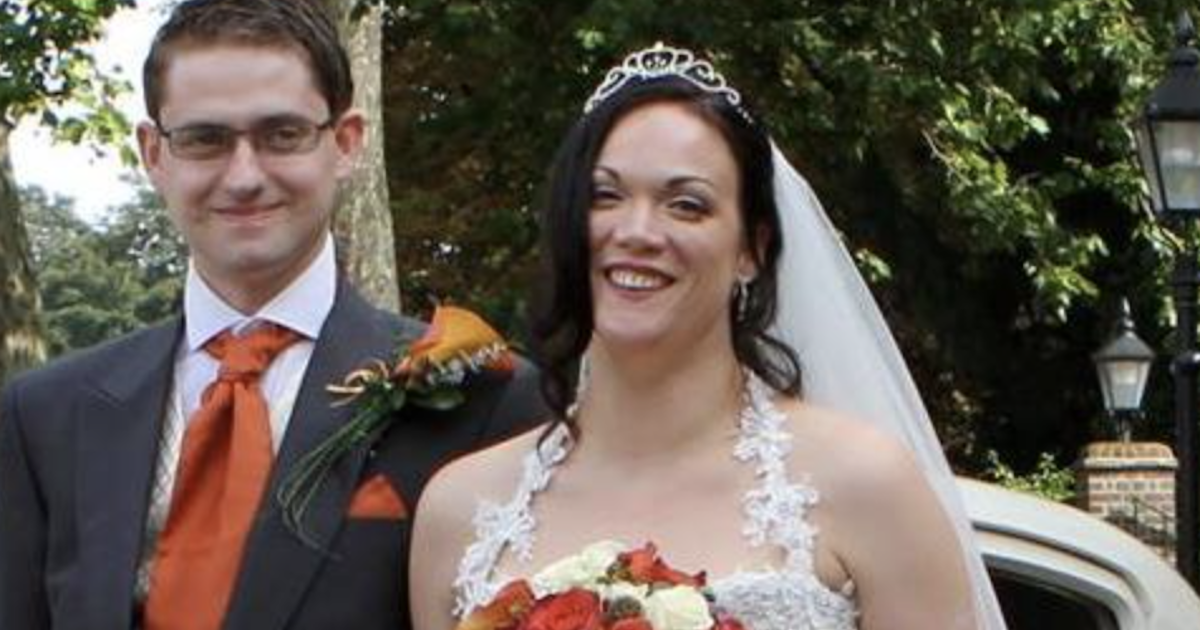Gemma Blezard, 37, Is Now Busy Making Memories With Her Daughter
- Gemma Blezard, 37, began her cancer journey eight years ago when she discovered lump in her breast. That unwelcome discovery came during her final wedding dress fitting just six days before the ceremony.
- Blezard, who has a daughter Mollie, 9, beat cancer with chemo and a lumpectomy, but it returned in 2018. That time she had a double mastectomy and her ovaries removed, but it returned a third time earlier this year. Now divorced, she finds herself battling terminal cancer and raising her daughter.
- Blezard shares her story on her blog. “The sharing of emotions is extremely validating, supportive, and freeing. Many cancer patients fear sharing their true emotions with loved ones in fear of burdening them or believing that others simply won’t understand,” psychologist Dr. Marianna Strongin tells SurvivorNet.
Gemma Blezard, 37, began her cancer journey eight years ago when she felt a lump in her breast. That unwelcome discovery came during her final wedding dress fitting just six days before the ceremony.
Read More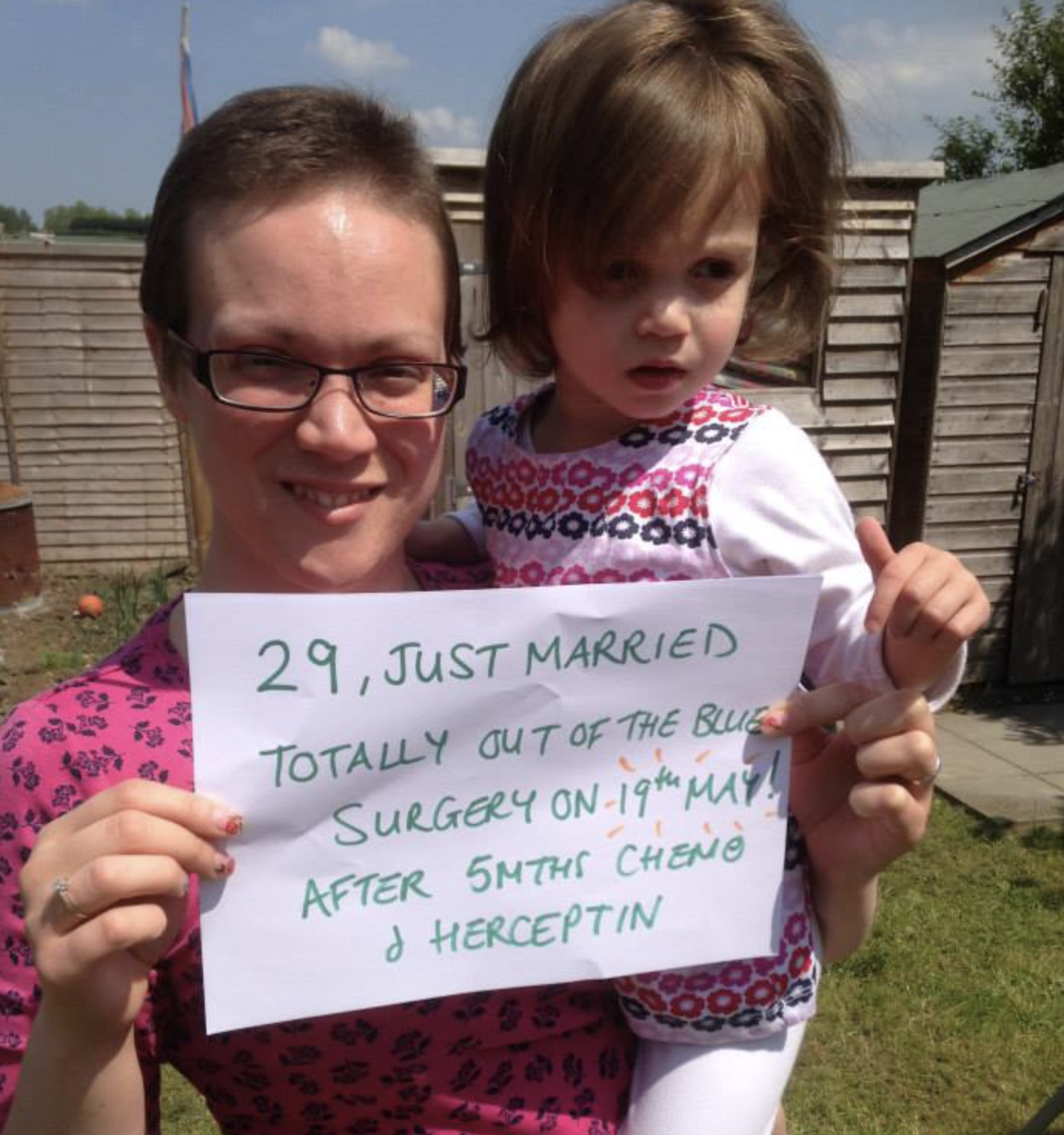
Breast Cancer Lump Battle
After chemotherapy, a lumpectomy, radiation therapy, and hormone therapy, doctors found no trace of cancer in Blezard’s body. She had even been able to work through most of her treatment, noting that chemotherapy was not a problem as long as she remembered to take her pills.She wrote about her first chemo treatment, saying she felt well enough to cook dinner just hours later, but she made one mistake.
“The silly thing I didn't do was take the anti-emetics before I felt sick, so they wore off by the time dinner was ready. I felt so ill, I had to go to bed without eating what I'd cooked; it felt like the world's worst hangover,” noted Blezard.
“A few times, I got up to vomit, but nothing came out. I just laid in my bed with my music on, ondansetron under my tongue, desperately trying to distract myself from the God-awful feeling and get off to sleep. Eventually, I did, alone and crying, angrily wondering again and again why this stupid thing had to happen to me.”
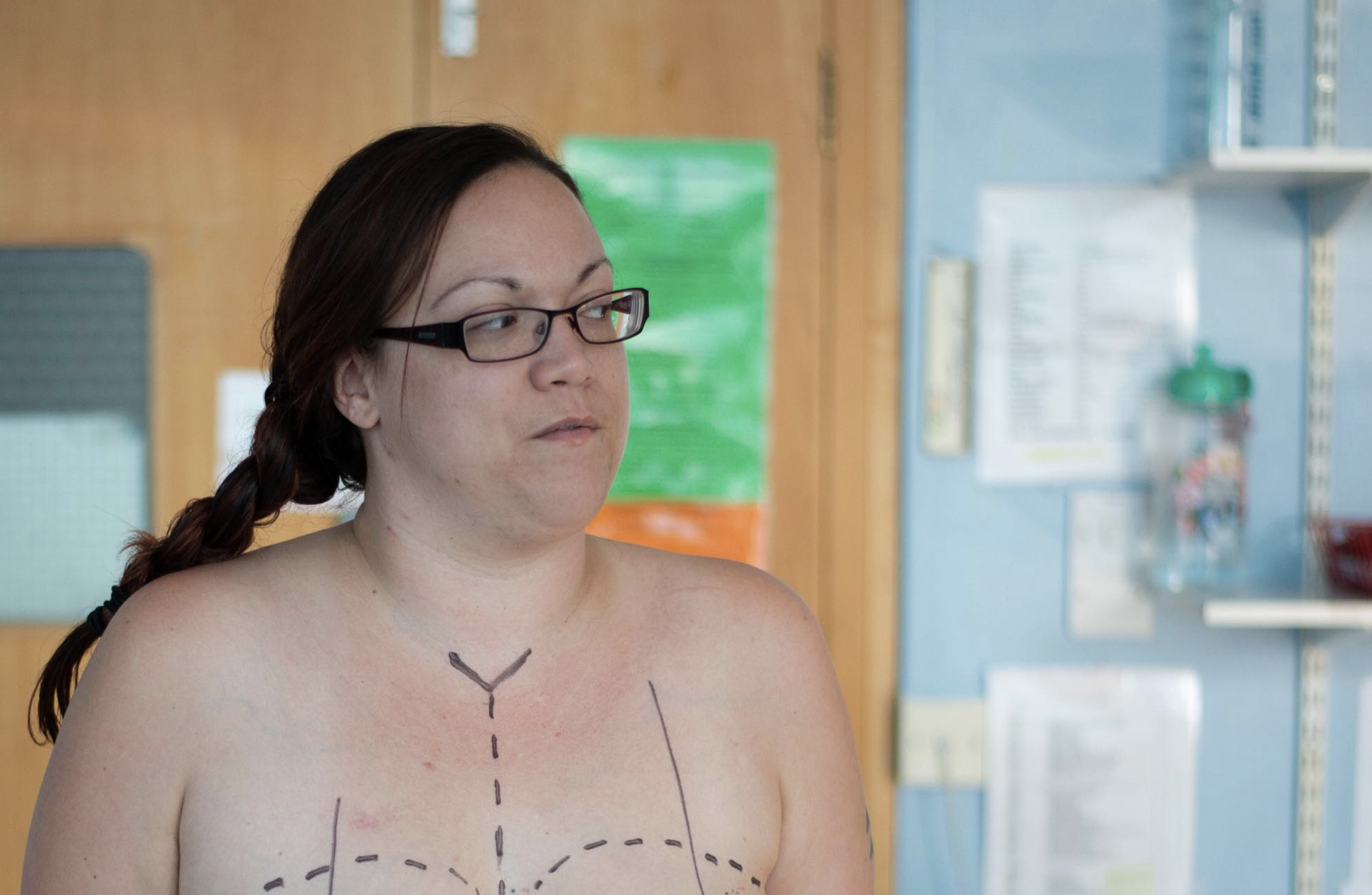
Breast Cancer Lump Round Two
Blezard showed no signs of the disease in the years that followed, and then, just a few months before she would have hit the milestone five-year mark, she learned the disease returned after a routine mammogram.
Once again, it was a breast cancer lump.
Blezard elected for multiple surgeries, hoping to eliminate any chance of the disease returning for the third time.
“I'd originally said I preferred to have a double mastectomy with an immediate reconstruction using implants (yay, I'd get my Katy Perry boobs!),” said Blezard at the time.
“It made sense to me easy operation, maybe I'd have to go back and have a couple of tweaks later.”
She noted that seeing the “amazing” before/after photos of a friend’s wife also got her excited about the prospect of surgery.
That excitement shifted, however, when she met with her plastic surgeon.
“When he started to draw it all out, I was choking back the tears when I realized how much they were going to do to me,” said Blezard.
“The fact that he'd said it was the gold standard made it a no-brainer, but still, it's huge.”
Blezard also elected to have her ovaries removed after that double mastectomy, waiting until she recovered before going in for her second operation.
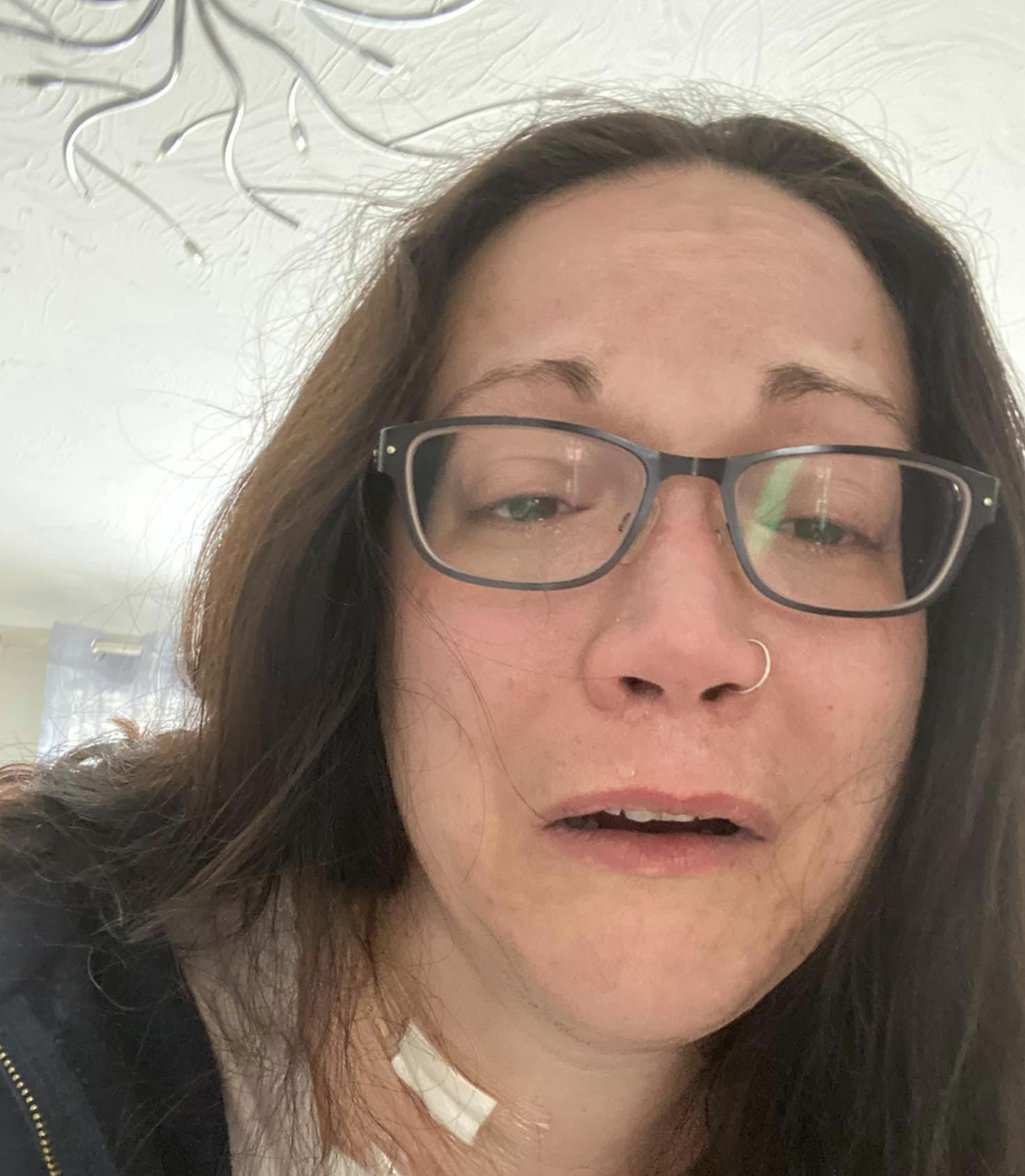
Terminal Cancer Diagnosis
Then, earlier this year, Blezard shared a brief post before the night before she got the results of her most recent check-up.
“It was a bit upsetting this time,” admitted Blezard.
“I am hopeful, although I reckon I'll need chemotherapy again, as it's lymph nodes on the opposite side of my body to where the breast cancer was originally.”
Her main concern at the time was her hair.
‘[Chemo] sucks, coz after seven years, my hair is now long and thick and looks awesome when straightened. Boo,” wrote Blezard.
Blezard learned the next day that the cancer had spread to her “sternum, pelvis, upper arms, femurs, spine, neck and ribs.” And, as she described it, “the bloody lymph nodes too.”
She also learned that this time the cancer was terminal.
“What the FUCK. What the fucking fuck is going on. I'm actually going to die,” wrote Blezard.
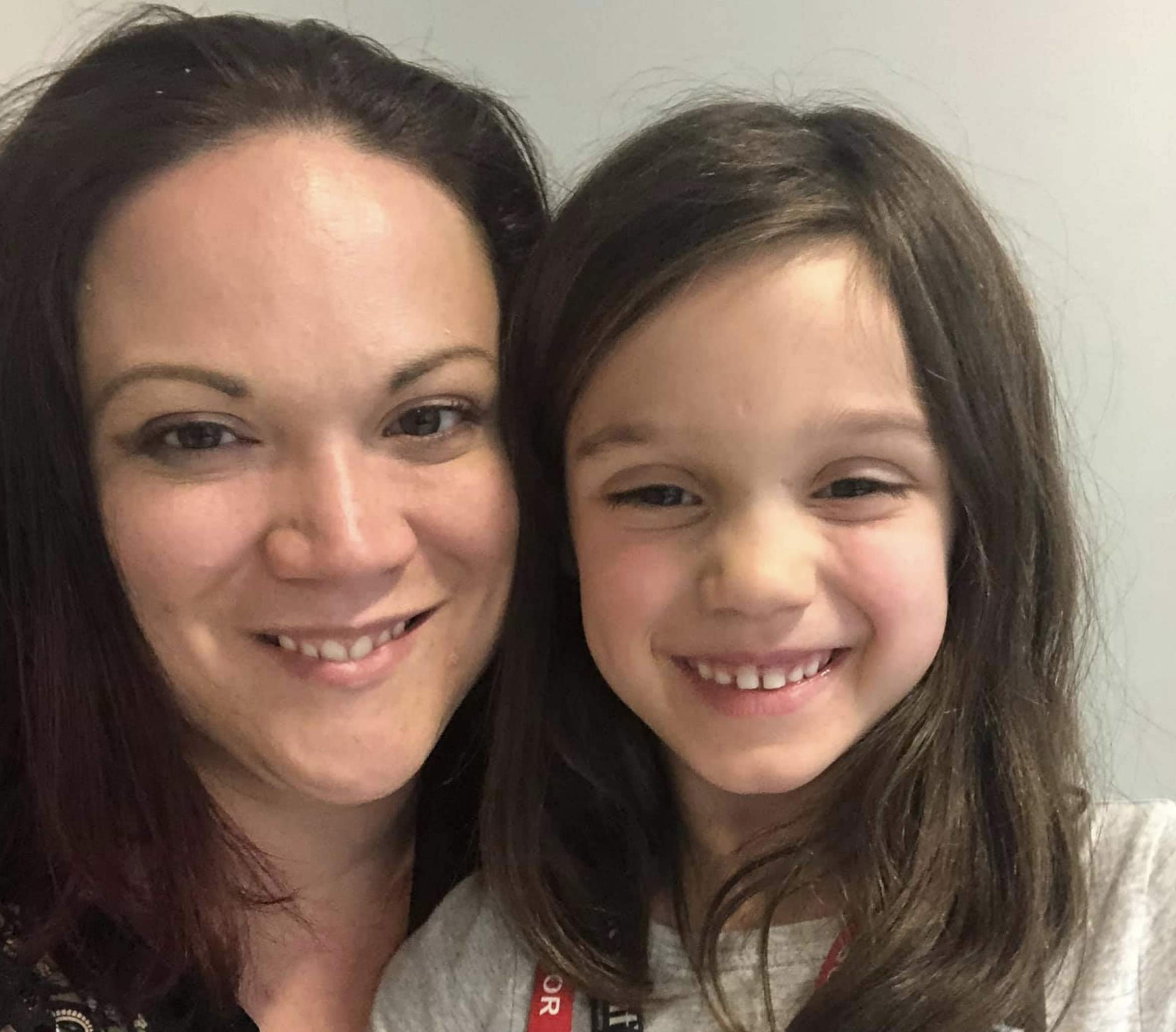
She launched a Go Fund Me a short time later, employing the same frank and genuine tone used on her website.
Thanks to COVID, the NHS is a pretty hostile place for stage 4 cancer treatment, and I've been paying for private insurance; it's extending my life. We Brits don't usually do GoFundMe for ourselves. I'm worried that someone out there will take the mick out of me or accuse me of using cancer to get money.
I long to make some memories with my nine-year-old daughter Mollie before I get too sick and shuffle off. She and I are fiercely close, and the thought of leaving her is devastating. The cancer is in my liver and throughout the skeleton, and I start chemo in a week. I’m hoping to make it at least another year.
I'd love to make some memories with her. Take her out for dinner, the theatre, and maybe even take one last holiday together.
If you'd like to help me, I will be very honored. If you don't, that's perfectly ok, and thank you for reading this page.
That tone worked, and Blezard has managed to meet her goal 60 times over, which is why she and her daughter Mollie will be going to Paris for Christmas.
Blezard is also doing all she can to extend the time she has with her daughter and revealing that the mental health treatment she receives is just as necessary as the medical treatments for her cancer. Therapy is also helping her deal with the demise of her marriage.
She divorced her husband while recovering from her second bout with cancer and recently wrote about how difficult it can be fighting breast cancer with no one by her side.
“I feel alone when I have difficult decisions to make or tough conversations to have, and I find myself reaching out to people I trust for help with them. And then I feel incredibly guilty about it; people have had tough years of their own since COVID hit. They don't need to hear me whining,” noted Blezard.
“I still sometimes feel out of control of my life. Like I'm weak, and I don't deserve the success I have had in my career because of things I missed early on or mistakes I made whilst learning. I've had malicious tweets from people who know what I'm going through and still want to kick me.”
She then closed by noting: “Believe me, nothing/no one can kick me harder than I do myself. But my soul is healing, and most days, I am okay. I just take each day as it comes.”
Coping With Anxiety During Breast Cancer Battle
Gemma Blezard is open with her feelings on her website but struggles with anxiety while navigating her uncertain future.
“When confronted with difficult emotions, it is important to allow ourselves to listen, feel and understand them,” Dr. Marianna Strongin wrote in her SurvivorNet column Strong In Cancer.
She then created a hypothetical situation and how best to express emotion at that moment.
“For example, if you find yourself filled with anger while exposed to Cancer Awareness content, I would like for you to first acknowledge the feeling- ‘I am angry because while others get to share their story of recovery, mine is different,'” she explained.
“Then it’s important to let that feeling move through your body and acknowledge it, “Anyone in my shoes would be feeling this way; I should be angry.'”
She continued: “Now you can soothe it, ‘I have found my way of coping with this and choose to live in the moment, but this month is extra hard.’ By recognizing and validating our feelings, we are much more likely to let these intense emotions go and refrain from “acting” them out.”
Dr. Strongin also noted the importance of sharing feelings, fears, and anxieties with “others who provide you with safety and security” ahead of potentially tricky or triggering moments.
“Studies have found that sharing emotions in a similar support group has been found to greatly improve quality of life.,” she wrote.
And later in the column, she explained: “The sharing of emotions is extremely validating, supportive and freeing. Many cancer patients fear sharing their true emotions with loved ones in fear of burdening them or believing that others simply won’t understand.”
How To Voice Anxiety During Breast Cancer Battle
Mammogram Guidelines
Mammograms helped detect Gemma Blezard’s cancer multiple times throughout her eight-year cancer journey.
Women aged 45 and 54 should have annual mammograms; women with a history of breast cancer in their families or who have battled the disease should begin screening even earlier.
In a previous interview, Dr. Connie Lehman, the chief of the Breast Imaging Division at Massachusetts General Hospital, emphasized how mammograms save lives. She says, "If you haven't gone through menopause yet, I think it's essential that you have a mammogram every year. We know that cancers grow more rapidly in our younger patients, and having that annual mammogram can be lifesaving."
The centers for Disease Control echoes this, stating that women aged 40 to 44 years should have the choice to start breast cancer screening once a year with mammography if they wish to do so, regardless of the reason.
Meanwhile, lawmakers in the House of Representatives and Senate are backing a bill protecting access to free mammograms.
The Protecting Access to Lifesaving Screenings (PALS) Act was reintroduced this week by Rep. Debbie Wasserman Schultz (D-FL) and Rep. Congressman Fred Upton (R-MI) in the House and Sen. Dianne Feinstein (D-CA) and Sen. Marsha Blackburn (R-TN) in the Senate.
If passed, the bill would guarantee free mammograms at least once a year to all women 40 and over.
The U.S. Preventative Services Task Force (USPSTF) rates mammograms a C for women in the 40 – 49 age range, meaning that they do not recommend annual screenings. That is at odds with the recommendations of the American College of Obstetrics and Gynecology, the National Comprehensive Cancer Network, the American College of Radiology/Society for Breast Imaging, and many experts in the field of oncology.
"The notion that breast cancer is a risk only for older people puts young women at risk of not getting a screening that could save their lives. The USPSTF guidelines would exacerbate this problem by discouraging women from getting potentially lifesaving mammograms and putting them at risk of losing insurance coverage for screenings," said Rep. Wasserman Schultz.
"As a breast cancer survivor who was diagnosed at 41, I know firsthand the importance of ensuring young women have access to the tools and information they need regarding their breast health. That is why I am proud to reintroduce the PALS Act with Congressman Upton, which extends the moratorium on these ill-advised guidelines and is supported by leading clinical and advocacy organizations."
Related: When You're Getting a Mammogram, Ask About Dense Breasts
"After menopause, it may be perfectly acceptable to reduce that frequency to every two years," says Dr. Lehman. "But what I'm most concerned about is the women who haven't been in for a mammogram for two, three, or four years, those women that have never had a mammogram. We all agree regular screening mammography saves lives."
When Should I Get a Mammogram?
Learn more about SurvivorNet's rigorous medical review process.

